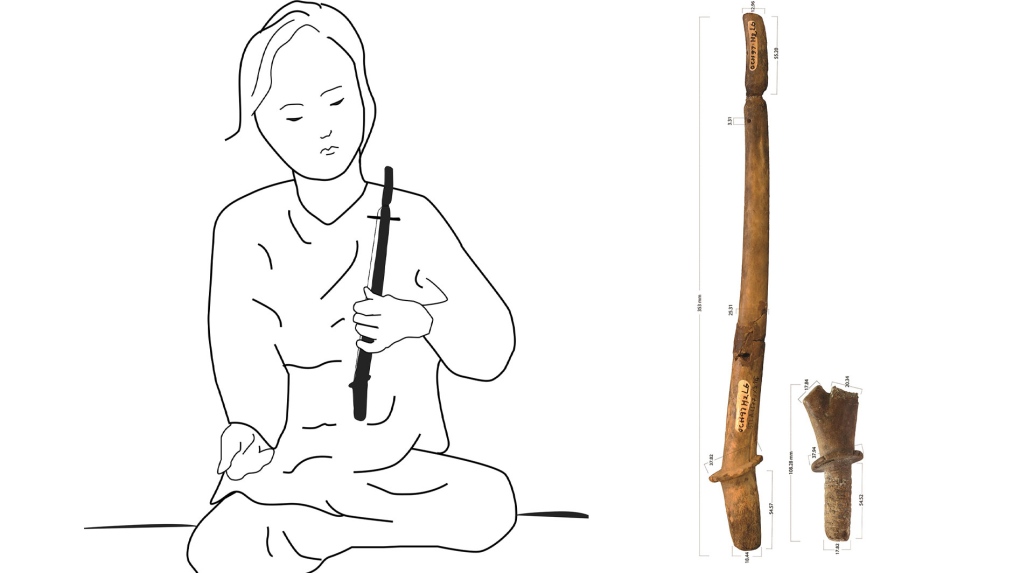
Lindholm scores the winner for Canucks in OT
Just over a minute into overtime, Elias Lindholm scored, bringing the Vancouver Canucks to victory over the Nashville Predators in Game 4.
Researchers say they have uncovered a 2,000-year-old stringed musical instrument in southern Vietnam.
The discovery was published Tuesday in the peer-reviewed archeology journal Antiquity. The artifact was found at the archaeological site of Gò Ô Chùa, in the Long An province of southern Vietnam.
The instrument was crafted from deer antler and dates back to the country’s pre-Óc Eo culture along the Mekong River, according to researchers.
"This stringed instrument, or chordophone, is one of the earliest examples of this type of Instrument in Southeast Asia,” lead researcher and PhD student Fredeliza Campos from the Australian National University said in a news release.
More than 600 bone artifacts were analyzed by Campos and her collaborators while uncovering this instrument.
"It fills the gap between the region's earliest known musical instruments – lithophones or stone percussion plates – and more modern instruments," said Campos.
"It would’ve been around 35 centimetres long and had a hole at one end for a peg, which would’ve been important for tuning. It also had what looks like a bridge to support the string.
"No other explanation for its use makes sense.”
There were no other artifacts like it found at the site, suggesting to researchers it was made by specialists who may have been musicians themselves.
"It is clearly established that music played an important role in the early cultures of this region. The striking similarities between the artifacts we studied and some stringed instruments that are still being played suggest that traditional Vietnamese music has its origins in the pre-historic past," Campos added.
Researchers believe that the instrument might have been played in a similar fashion to contemporary Vietnamese musical instruments such as the K'ný.
"The K'ný is a single-string bowed instrument that is uniquely controlled by the player’s mouth, which also acts as a resonator. It can play a wide variety of sounds and tones, much more than a chromatic scale you often hear on a piano," Campos said.

Just over a minute into overtime, Elias Lindholm scored, bringing the Vancouver Canucks to victory over the Nashville Predators in Game 4.
Three women diagnosed with HIV after getting 'vampire facial' procedures at an unlicensed medical spa are believed to be the first documented cases of people contracting the virus through a cosmetic procedure using needles.
All 79 locations of pharmacy and retail chain London Drugs are shut down Sunday, and there is no estimate on when they will be back open.
One person was killed in a six-vehicle crash on Highway 400 in Innisfil Friday evening.
Ontario is introducing a suite of measures that will crack down on cellphone use and vaping in schools.
Australia's Prime Minister Anthony Albanese on Monday described domestic violence as a 'national crisis' after thousands rallied around the country against violence toward women.
Rookie goalie Arturs Silovs will start in net for the Vancouver Canucks when they face the Nashville Predators in Game 4 of their first-round playoff series Sunday.
U.S. intelligence officials have determined that Russian President Vladimir Putin likely didn't order the death of imprisoned opposition leader Alexei Navalny in February, according to an official familiar with the determination.
Tornadoes killed four people in Oklahoma and left thousands without power Sunday after a destructive outbreak of severe weather flattened buildings in the heart of one rural town and injured at least 100 people across the state.

The lawyer for a residential school survivor leading a proposed class-action defamation lawsuit against the Catholic Church over residential schools says the court action is a last resort.
Raneem, 10, lives with a neurological condition and liver disease and needs Cholbam, a medication, for a longer and healthier life.
As if a 4-0 Edmonton Oilers lead in Game 1 of their playoff series with the Los Angeles Kings wasn't good enough, what was announced at Rogers Place during the next TV timeout nearly blew the roof off the downtown arena.
Mounties in Nanaimo, B.C., say two late-night revellers are lucky their allegedly drunken antics weren't reported to police after security cameras captured the men trying to steal a heavy sign from a downtown business.
A property tax bill is perplexing a small townhouse community in Fergus, Ont.
When identical twin sisters Kim and Michelle Krezonoski were invited to compete against some of the world’s most elite female runners at last week’s Boston Marathon, they were in disbelief.
The giant stone statues guarding the Lions Gate Bridge have been dressed in custom Vancouver Canucks jerseys as the NHL playoffs get underway.
A local Oilers fan is hoping to see his team cut through the postseason, so he can cut his hair.
A family from Laval, Que. is looking for answers... and their father's body. He died on vacation in Cuba and authorities sent someone else's body back to Canada.
 Researchers believe they have uncovered a 2,000-year-old stringed instrument in southern Vietnam (right). Here’s how it might have been played. (Supplied)
Researchers believe they have uncovered a 2,000-year-old stringed instrument in southern Vietnam (right). Here’s how it might have been played. (Supplied)